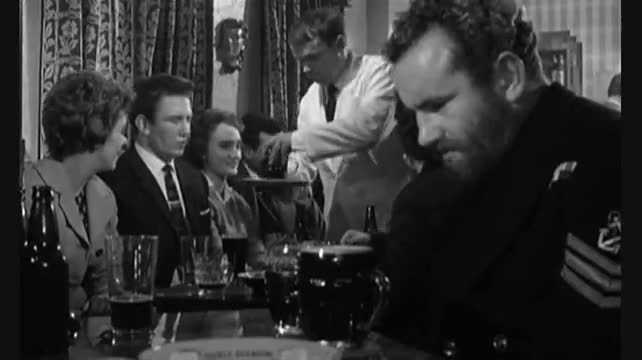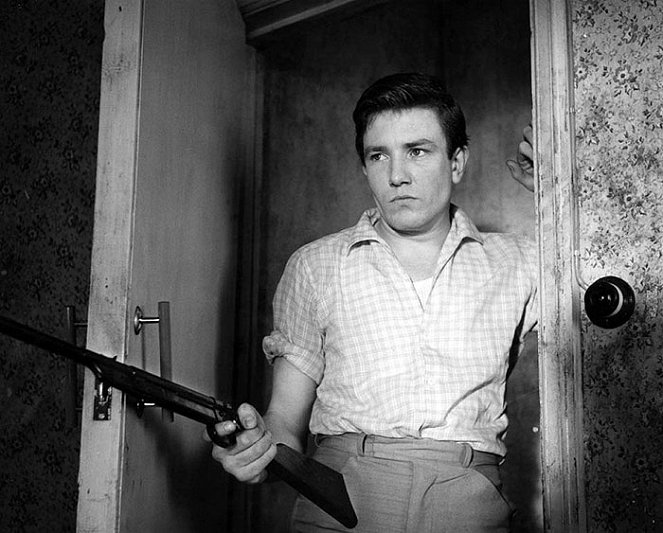Ohjaus:
Karel ReiszKäsikirjoitus:
Alan SillitoeKuvaus:
Freddie FrancisSävellys:
John DankworthNäyttelijät:
Albert Finney, Shirley Anne Field, Rachel Roberts, Peter Sallis, Colin Blakely, Cameron Hall, Peter Madden, Alister Williamson, Hylda Baker (lisää)Juonikuvaukset(1)
Lauantai-illasta Sunnuntaiaamuun (Saturday night and Sunday morning) oli lähtölaukaus brittielokuvan 60-luvun uudelle aallolle. Elokuvaa pidetään yleisesti ensimmäisenä ja parhaana työväen arjen kuvaajana. Ohjaaja Karel Reiszin suorapuheinen työväenluokan draama palkittiin parhaana elokuvana British Film Awardseissa. (Atlantic Film Fin.)
Videot (1)
Arvostelut (3)
I've heard about a film in which two people cannot agree on whether to go see a film on Saturday night and Sunday morning. Many years later I found out that the mentioned title actually exists. Perhaps no other film from the 50s captures the life of the British working class so convincingly. Reisz's style, similar to a documentary film, managed to capture the look and atmosphere of the working-class neighborhoods of that era. The young people of that time saw in the main character someone who was not afraid to live his own life and who threw social conventions out the window. One should not perceive Arthur Seaton as a rebel who wants to change and fix the world, but rather as an unfinished predecessor to Renton from Trainspotting. Arthur just wants to enjoy himself and he actually needs very little - some alcohol, available sex without commitments, and the feeling that no one is telling him what to do in life. The film violated two fundamental social taboos of its time - the affair of a married woman with a scoundrel and, above all, abortion, which was understandably strictly prohibited at that time. The sexual revolution was far from being on the agenda, and the society of the 50s was prudish. Overall impression: 85%.
()
A completely interesting capturing of time and place through young people who are not really sure what it means to live. The environment is wonderfully portrayed and the fact that the film is in black and white greatly helps. That world has the same effect as the young minds. Albert Finney shows how great of an actor he was already at the beginning of his career.
()
As one of the first instances of transferring the rage of English youth from books to film, Saturday Night and Sunday Morning no longer has the same impact of other social dramas that came earlier (On the Waterfront) or later (Accattone). With its unidyllic, aloof framing, Reisz’s portrait of an overly proud member of the working class is unable to convey the rage that the protagonist feels towards the older (and ruling) generation in a sufficiently evocative way. In this respect, Schorm’s drama Courage for Every Day is more impressive, as it is down-to-earth in more ways than Reisz’s film, though it also gives preference to dramatisation over mere observation (so the immediacy inherent in the cinéma-vérité style is lacking). Due to the conservative British culture, however, it is nevertheless necessary to appreciate the courage to show the behaviour of a few frustrated, irresponsible youths who disdain conventions and display a degree of animalism (Arthur often gorges himself on food and beer and does not restrain himself in the area of sex) without judgment, or rather without taking an unambiguous moralistic standpoint. The film also raised controversy in its time with its characters’ non-standard vocabulary and the issue of abortion (paradoxically, American censors were more outraged by this), which made Saturday Night and Sunday Morning a particularly historically valuable litmus test for gauging the mood of a society in which tumultuous changes were brewing. 75%
()



Mainos